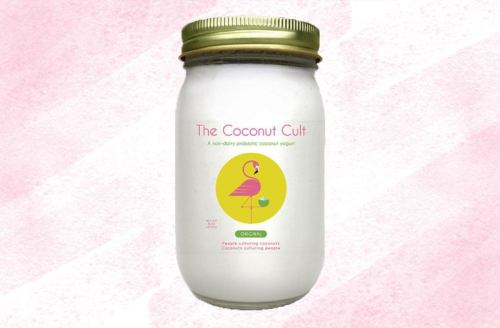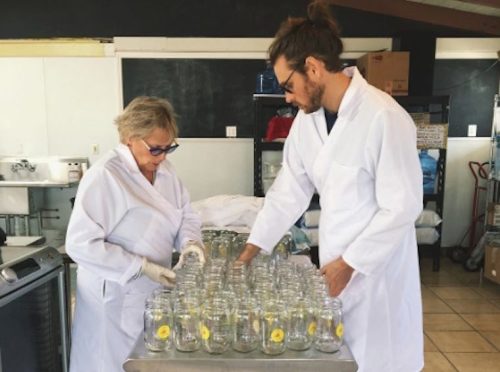Why is everyone obsessed with this $25 vegan yogurt?
Healthy insiders are shelling out big bucks for this coconut yogurt with seriously potent probiotics and organic ingredients—all in the name of good gut health.

As if you needed to carve out more room in your superfood budget, there’s a new wellness splurge that healthy insiders are deeming totally life-altering: coconut yogurt that costs as much as a yoga class.
Okay, hold that eye-roll. The Coconut Cult’s ferments aren’t so much a snack as they are a seriousprobiotic supplement. They’re so strong, in fact, that newbies are advised to eat only two tablespoons per day—otherwise, you may experience a few, er, digestive surprises. And when you consider the fact that there are 16 servings of that size in a $25, 16-oz. jar—that works out to about $1.50 a hit—it actually starts to seem kind of reasonable. (That said, most people eat more than that once they build up a tolerance.)
The Coconut Cult’s ferments aren’t so much a snack as they are a serious probiotic supplement.
The Los Angeles-based brand’s established a major presence in high-end health food stores up and down the coast, from Erewhon and Earthbar in Los Angeles to Rainbow Co-Op and Driver’s Market in the Bay Area. And as of July, they’ll be stocked in all Dean & Deluca stores, which means those in New York City, Washington DC, and even North Carolina and Kansas can get in on the craze. (That is, if they’re not already part of The Coconut Cult’s subscription-based, home-delivery club.)
“Our business is growing like crazy—we’re basically doubling and tripling sales [on a month-to-month basis],” says The Coconut Cult founder Noah Simon-Waddell. “I attribute it to word of mouth. It’s a heavy-duty supplement that’s worth more than it costs to a lot of people.” Given all the recent research linking poor gut health to everything from depression to acne to insomnia, it’s no surprise that the wellness-devoted are opening up their wallets for this probiotic powerhouse.
But still, exactly why are so many people going cuckoo for Coconut Cult? And at $25, is it really worth it? Here’s everything you need to know about the yogurt.

What the heck is in this stuff, anyway?
Believe it or not, The Coconut Cult isn’t the only yogurt that’s priced in the double digits. At Erewhon in Venice, CA, I also spotted jars by New Earth Superfoods and Coco Rico, both of which hover around the $20 mark. (And CoYo and GT’s both sell similar yogurts under $10.)
But one thing that sets the brand apart from its microbiome-boosting competition is that it’s filled with 15 strains of human probiotics. They’ve all been growing in a lab since being taken from actual people 30 years ago, and they work synergistically with the four other non-human bacteria strains in the formula. (Yes, it sounds gross. But each jar is said to contain 800-billion colony forming units (CFUs) of probiotics, compared to the 15–30 billion CFUs in GT’s coconut yogurt by comparison.
Unlike other probiotics that pass through your system, these bacteria hang out a bit longer in your gut, says nutritionist (and Well+Good Wellness Council member) Kimberly Snyder, CN. “In my research and experience, resident forming strains like those in this yogurt—versus the transient ones in most cultured foods—make it unique and potentially more helpful than typical probiotic food products,” she says. “The fact that it doesn’t contain dairy is also a positive.”
“The main difference is we’re taking all these fancy, freeze-dried probiotics and waking them up in coconut.”
Several top-tier supplement brands also utilize human probiotics, but Simon-Waddell says there are benefits to getting these good bugs through food. “In order to make bacteria into pill form, you have to freeze-dry them into a powder,” he says. “When you freeze them, they’re hibernating. They first have to survive your stomach acids, and then they have to land in your intestines and wake back up. The main difference is we’re taking all these fancy, freeze-dried probiotics and waking them up in coconut. They can survive your stomach acid and are ready to start working with your body.” (Plus, the tropical fruit’s giving you a dose of healthy fat with every spoonful.)
And then there’s the fact that the yogurt’s made from whole ingredients, with no added sugars, preservatives, or fillers. The original version contains just two ingredients—organic coconut and probiotics—while the Coconut Cream and Mango Cream flavors are fermented with orange juice and mangoes (both organic), which lend them an especially fluffy, creamy consistency.
“Everything’s completely made by hand and fermented in individual jars,” says Simon-Waddell. (For proof, check out the many exploding yogurt mishaps on the brand’s Instagram—don’t worry, those over-fermented jars never make it to stores, so there are no safety hazards.)

Is $25 yogurt worth it?
Many Coconut Cult members eat the yogurt daily in place of probiotic pills—in fact, Simon-Waddell says there’s one subscriber in Northern California who orders 48 jars every month. (That’s a $14,400 habit, annually.)
Why such loyalty? He says the yogurt affects everyone differently, but customers have told him it’s made some pretty profound differences in their health, beyond just digestion. “They say it changes the way they feel, the way they sleep, the way they go to the bathroom. It makes their migraines go away. It gets rid of their colds,” he claims. “I would never [promise] any of these things on the label or our website, but people are learning it firsthand themselves. It makes them lifelong customers—the people who get hooked make it part of their routine immediately.”
“I’ve been slowly working my way through a jar of Coconut Cream, and I have to say, I fully understand the obsession.”
I’ve been slowly working my way through a jar of Coconut Cream, and I have to say, I fully understand the obsession. Not only is my digestion already moving at a more rapid clip (TMI?), but the stuff tastes amazing—it’s subtly sweet with a kick of tanginess, and its mousse-like texture makes it a totally satisfying follow-up to a savory dinner. Any benefits beyond that remain to be seen, but I’m willing to finish off the last dozen servings to see what happens.
After that, however, I certainly can’t justify spending a quarter of my weekly grocery budget on yogurt alone, and I’m sure I’m not the only one. This is what Snyder considers The Coconut Cult’s biggest downfall. “The cost of this product is prohibitive for very regular consumption for most people,” she says. “Even highly effective probiotic products need to be consumed on a daily basis, as our gut flora is constantly under assault from environmental pollution, heavy metals, compromised water, stress, and so on. Investing in an excellent probiotic supplement that can be taken daily would be my recommendation.”
So if your bank account can support a $100-a-month (or more) probiotic habit, by all means, join the cult. (Like I said, I would if I could.) But if not, there are plenty of under-$50 options that’ll keep both your gut and your financial advisor happy.
For more (expensive!) products that healthy folks swear by, check out the best over-$100 moisturizers and the items that wellness insiders always splurge on.
Sign Up for Our Daily Newsletter
Get all the latest in wellness, trends, food, fitness, beauty, and more delivered right to your inbox.
Got it, you've been added to our email list.










